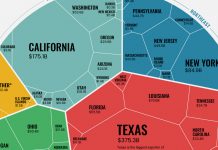Assuming you convey charge card obligation, odds are good that your regularly scheduled installments will rise pointedly this year.
The Federal Reserve just climbed its government supports rate by 3/4 of a rating point, which places the rate in a reach somewhere in the range of 1.5% and 1.75%. It was the third increment this year, and more are figured out for 2022.
Banks ordinarily utilize the government finances rate to set rates for Visas and customer advances. That implies each Fed rate climb could push up your getting costs.
“Mastercard loan fees will surely rise,” says Mike Sullivan, an individual monetary specialist with taking Charge America, a charitable credit directing and obligation to the executive’s office.
How Credit Card Interest Works
You can imagine a charge card’s loan fee as the cost you pay for the honor of getting cash. Your advantage every month depends on the sum you have acquired and have not paid off.
This financing cost is generally communicated as a yearly rate known as the yearly rate, or APR. In any case, Visa guarantors frequently compute the interest you owe consistently utilizing your typical day-to-day balance.
“Higher loan fees mean the expense of utilizing credit will be more costly, as purchasers will pay more in interest,” says Jeff Arevalo, monetary wellbeing master with GreenPath Financial Wellness, a not-for-profit credit guiding, and obligation the board organization.
The most effective way to keep away from interest is to constantly take care of your equilibrium in full. In the event that you don’t, then, at that point, you will be charged interest on the equilibrium you extend.
What a Fed Rate Hike Means for Your Credit Card’s APR
Each time the Federal Reserve raises loan costs, you can expect a leap in your Mastercard’s APR. A couple of charging cycles might pass before you see the expense increment.
“Mastercard organizations are restless to build rates and get more cash-flow, however they are directed by market influences,” Sullivan says. “On the off chance that one bank hurries to increment rates when lawfully conceivable, it could lose clients to different banks who move all the more leisurely to acquire a piece of the pie.”
At the point when the change kicks in, “Revenue charges on records will be more noteworthy, and it will require bigger installments just to remain even,” Sullivan says.
Suppose you had planned $397 per month to pay off $15,000 north of 60 months on a charge card with a 19.9% APR. In the event that the APR changed to 22.9%, you would have to pay $423 every month to get the equilibrium in a similar sum free from time, Sullivan says.
“That implies less cash for different costs,” he adds.
What Rate Hikes Mean for Credit Card Debt
Because of increasing loan fees, numerous customers will wind up paying a lot higher interest costs, implying that utilizing Mastercards will turn out to be significantly more costly. Something like one figure has normal Visa rates beating 18% before the year’s over, a record high, Arevalo says.
“A higher APR on a higher rotating Visa equilibrium could mean purchasers will pay a huge number of dollars more,” he says. “Purchasers should pay significantly more every month just to cover interest charges, which could increment monetary pressure.”
Tragically, a huge number of Americans are somewhere down in Visa obligation. “Visa spending and balances have expanded,” Arevalo says. “Expansion is driving this.”
Disposing of your charge card obligation is the most ideal way to manage loan cost climbs, Sullivan says.
“As a rule, it is an ill-conceived notion to convey charge card obligation,” he says. “It is a costly method for acquiring cash and can undoubtedly bring about costs that are 100 percent expanded from genuine buy costs.”
Scarcely any individual can bear the cost of a way of life in view of charging buys and conveying an equilibrium, Sullivan says. “At last, we either hit rock bottom financially,” he says.
The most effective method to Pay Off Debt Fast
Assuming you desire to take care of charge card obligation rapidly, the initial step is to take care of the plastic. “You can’t escape an opening until you quit digging,” Sullivan says.
Center around wiping out the obligations with the most elevated loan fees first, he says. Give additional cash to the Visa with the most noteworthy APR, “regardless of whether it implies making the base installment on each and every other bill,” Sullivan says.
To take care of obligation quickly, attempt to track down a wellspring of additional cash. “Take a seasonal work,” Sullivan says. “Sell things you don’t must have.”
Focusing on your objective of wiping out obligations could assist you with getting you there quicker. “Put off all consumptions imaginable to let loose more dollars,” Sullivan says.
You should call your charge card guarantor to check whether you can get a lower APR, Arevalo says. “Assuming that your credit is not exactly ideal, think about developing your credit prior to making the solicitation,” he says.
You can support your credit over the long haul by:
Taking care of bills on time each time for something like a half year.
Making more than the base installment.
Keeping your credit use proportion – the level of complete accessible credit you’re utilizing – underneath 30%.
Turning into an approved client on the charge card of a confided relative or companion with magnificent credit.
In the event that your credit major area of strength is, a balance move is one more choice for diminishing your charge card acquiring costs. Attempt to get a 0% early on APR on your new card, Arevalo says.
“Be ready to take care of the equilibrium before the deal period closes,” he says.
With more rate climbs ahead, numerous buyers are as of now battling with their obligations, Arevalo says. “We’ve seen a weighty requirement for planning and steady administrations,” he says. “A considerable lot of our clients are as yet confronting diminished pay and employment cutback.”
In the event that obligation overpowers you, an obligation the executives plan from a believed philanthropic credit guiding office could help, Arevalo says. Loan bosses might postpone charges and lower financing costs in the event that you reimburse, frequently in three to five years, through an obligation to the board plan.
“A greater amount of your installment goes toward diminishing your record equilibrium, and you get a good deal on interest,” Arevalo says.





































